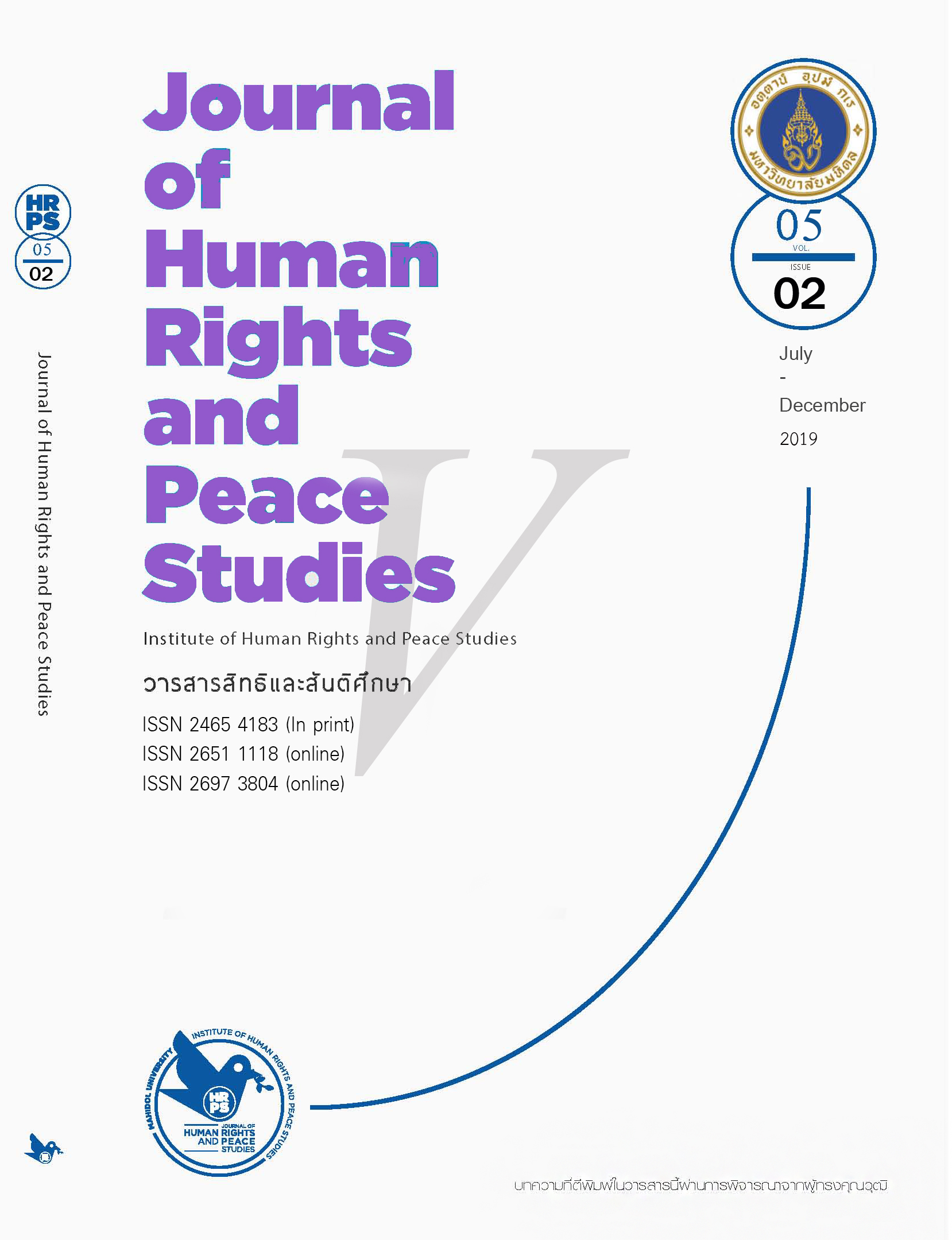Stuart Hall and New Ethnicities: Concept The Proposal for Cultural Diversity.
Main Article Content
Abstract
The famous British scholar, Stuart Hall, who was the immigrant from Jamaica had ever analyzed, criticized and proposed the solutions for social problems in ethnic conflict, ethnic minorities in Europe and other countries that implemented multiculturalism policies in 1980s.But Hall's proposal did not get attention and be adopted as a policy while the leaders of countries such as Germany, England, had come out to declare the failure to implement cultural diversity policies. The researcher found that in the new ethnic concepts (new ethnicities) in 1995, an analysis showed the struggle of black people, immigrants and minorities who used the essential identity of ethnicities to adjust relationships from being oppressed in England and the United States. Hall criticized this would cause long-term problems such as making identity to be political issues would cause the minorities could not harmonize themselves with societies that had social and cultural diversity. Moreover, Hall had also proposed everyone to think of a new ethnic style which was to create coordination with people who had different ethnic backgrounds, without causing their identity to become an identity that had problems in reducing differences both inside and outside the group and back to support the adaptation, the fusion of different people to be able to shift their social status and made the concepts that supported social and cultural diversity to have the hegemony in societies.
Article Details
The views, opinions, and pictures expressed in this journal are those of the authors and do not necessarily reflect the opinions and viewpoints of the editor and the editorial board. All rights are reserved by the authors and the Institute of Human Rights and Peace Studies of Mahidol University. No part of this journal may be reproduced, stored in a retrieval system, or transmitted in any form or by any means without the prior permission in writing from the journal’s editor, or as expressly permitted by law, or under terms agreed with the appropriate reprographics rights organization. Non-commercial use of information in this journal must be properly referenced.
References
นิติ ภวัครพันธุ์. (2559). ชวนถก ชาติและชาติพันธุ์ (2 ed.). กรุงเทพฯ: สำนักพิมพ์ศยาม.
ภาษาอังกฤษ
Bradford, P. V., & Blume, H. (1992). Ota Benga: The Pygmy in the Zoo. New York: St. Martin’s Press.
Fanon, F., Markmann, C. L., Sardar, Z., & Bhabha, H. K. (2008). Black skin, white masks. London: Pluto.
Hall, S. (1980). Encoding/decoding. In S. Hall & D. Hobson (Eds.), Culture, Media, Language: Working Papers in Cultural Studies, 1972–79 (pp. 117-126). London and New York: Routledge.
Hall, S. (1992). What Is This "Black" in Black Popular Culture? Social Justice, 20(1-2), 104-114.
Hall, S. (1995). New Ethnicities. In W. D. Ashcroft, G. Griffiths, & H. Tiffin (Eds.), The Postcolonialism Studies Reader (pp. 223-227). London: Routledge.
Hall, S. (1996). Introduction: Who Needs 'Identity'? In S. Hall & P. D. Gay (Eds.), Questions of Cultural Identity (pp. 1–17). London: Sage.
Hall, S. (1997). Old and New Identies, Old and New Ethnicities. In A. D. King (Ed.), Culture, Globalization and the World-System (pp. 41-68). Minneapolis: University of Minnesota Press.
Hall, S. (2000). Conclusion: the Multi-cultural Question. In B. Hesse (Ed.), Un/Settled Multiculturalisms: Diasporas, Entanglements, ‘Transurptions’ (pp. 209-255). London and New York: Zed Books.
Hall, S. (2017). Familiar stranger : a life between two islands. Durham: Duke University Press Books.
Hall, S. (2019a). Encoding and Decoding in the Television Discourse. In D. Morley (Ed.), Stuart Hall: Essential Essays Vol. 2 (pp. 258-276). Durham and London: Duke University Press.
Hall, S. (2019b). Gramsci’s Relevance for the Study of Race and Ethnicity [1986]. In D. Morley (Ed.), Stuart Hall: Essential Essays Vol. 2 (Vol. 1, pp. 21-54). Durham and London: Duke University Press.
Hall, S. (2019c). Old and New Identities, Old and New Ethnicities. In D. Morley (Ed.), Stuart Hall: Essential Essays Vol. 2 (pp. 63-82). Durham and London: Duke University Press.
Hall, S., Morley, D., & Chen, K. H. (1996). Stuart Hall: Critical dialogues in cultural studies, Comedia (Vol. null).
Haviland, W., Prins, H., Walrath, D., & Mcbride, B. (2005). Cultural Anthropology: The Human Challenge. Canada: Wadsworth.
Hiddleston, J. (2009). Understanding Postcolonialism: Négritude. Stocksfield: Acumen.
Morley, D. (2019). General Introduction. In D. Morley (Ed.), Stuart Hall: Essential Essays Vol. 2 (pp. 1-15). Durham and London: Duke University Press.
Mullings, L. (2005). Interrogating Racism: Toward an Antiracist Anthropology. Annual Review of Anthropology, 34(1), 667-693. doi:10.1146/annurev.anthro.32.061002.093435
Rattansi, A. (2007). Racism: A Very Short Introduction. Oxford and New York: Oxford University Press.
Rzepnikowska, A. (2019). Racism and xenophobia experienced by Polish migrants in the UK before and after Brexit vote. Journal of Ethnic and Migration Studies, 45(1), 61-77. doi:10.1080/1369183X.2018.1451308
Thomas, D. A., & Clarke, M. K. (2013). Globalization and Race: Structures of Inequality, New Sovereignties, and Citizenship in a Neoliberal Era. Annual Review of Anthropology, 42(1), 305-325. doi:10.1146/annurev-anthro-092412-155515
Valluvan, S., & Kapoor, N. (2016). Notes on theorizing racism and other things. ETHNIC AND RACIAL STUDIES, 39(3), 375-382. doi:10.1080/01419870.2016.1109680
Zhang, L. (2017). How to understand Stuart Hall’s “identity” properly? Inter-Asia Cultural Studies, 18(2). doi:10.1080/14649373.2017.1309498


